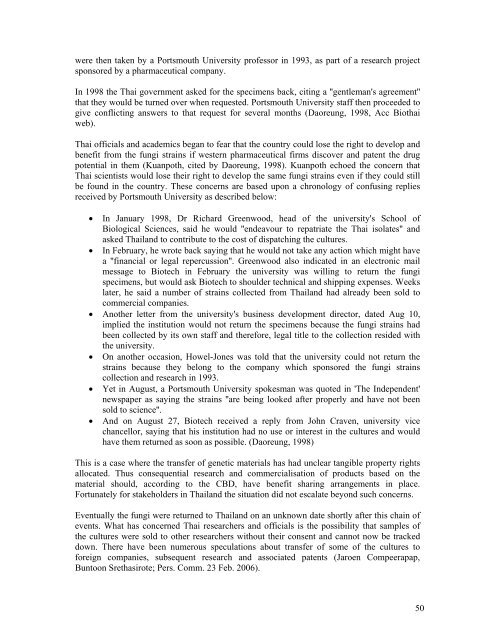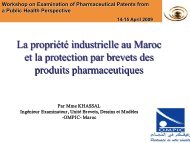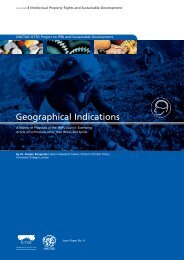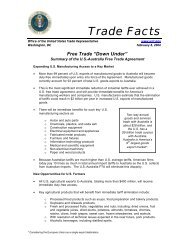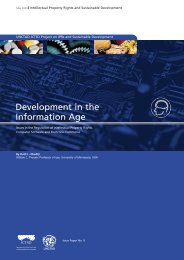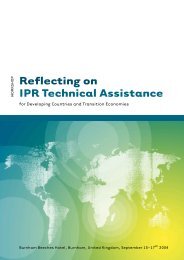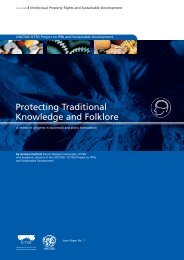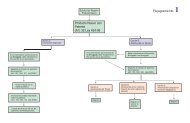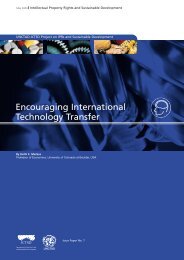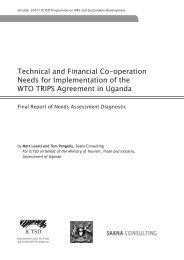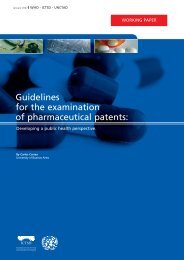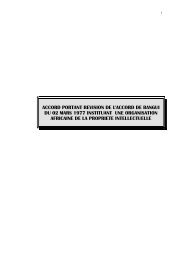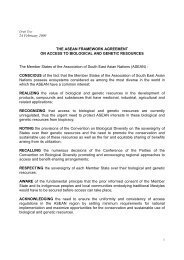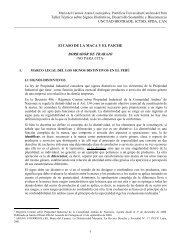Governance and Micropolitics of Traditional ... - IPRsonline.org
Governance and Micropolitics of Traditional ... - IPRsonline.org
Governance and Micropolitics of Traditional ... - IPRsonline.org
Create successful ePaper yourself
Turn your PDF publications into a flip-book with our unique Google optimized e-Paper software.
were then taken by a Portsmouth University pr<strong>of</strong>essor in 1993, as part <strong>of</strong> a research project<br />
sponsored by a pharmaceutical company.<br />
In 1998 the Thai government asked for the specimens back, citing a ''gentleman's agreement''<br />
that they would be turned over when requested. Portsmouth University staff then proceeded to<br />
give conflicting answers to that request for several months (Daoreung, 1998, Acc Biothai<br />
web).<br />
Thai <strong>of</strong>ficials <strong>and</strong> academics began to fear that the country could lose the right to develop <strong>and</strong><br />
benefit from the fungi strains if western pharmaceutical firms discover <strong>and</strong> patent the drug<br />
potential in them (Kuanpoth, cited by Daoreung, 1998). Kuanpoth echoed the concern that<br />
Thai scientists would lose their right to develop the same fungi strains even if they could still<br />
be found in the country. These concerns are based upon a chronology <strong>of</strong> confusing replies<br />
received by Portsmouth University as described below:<br />
• In January 1998, Dr Richard Greenwood, head <strong>of</strong> the university's School <strong>of</strong><br />
Biological Sciences, said he would ''endeavour to repatriate the Thai isolates'' <strong>and</strong><br />
asked Thail<strong>and</strong> to contribute to the cost <strong>of</strong> dispatching the cultures.<br />
• In February, he wrote back saying that he would not take any action which might have<br />
a ''financial or legal repercussion''. Greenwood also indicated in an electronic mail<br />
message to Biotech in February the university was willing to return the fungi<br />
specimens, but would ask Biotech to shoulder technical <strong>and</strong> shipping expenses. Weeks<br />
later, he said a number <strong>of</strong> strains collected from Thail<strong>and</strong> had already been sold to<br />
commercial companies.<br />
• Another letter from the university's business development director, dated Aug 10,<br />
implied the institution would not return the specimens because the fungi strains had<br />
been collected by its own staff <strong>and</strong> therefore, legal title to the collection resided with<br />
the university.<br />
• On another occasion, Howel-Jones was told that the university could not return the<br />
strains because they belong to the company which sponsored the fungi strains<br />
collection <strong>and</strong> research in 1993.<br />
• Yet in August, a Portsmouth University spokesman was quoted in 'The Independent'<br />
newspaper as saying the strains ''are being looked after properly <strong>and</strong> have not been<br />
sold to science''.<br />
• And on August 27, Biotech received a reply from John Craven, university vice<br />
chancellor, saying that his institution had no use or interest in the cultures <strong>and</strong> would<br />
have them returned as soon as possible. (Daoreung, 1998)<br />
This is a case where the transfer <strong>of</strong> genetic materials has had unclear tangible property rights<br />
allocated. Thus consequential research <strong>and</strong> commercialisation <strong>of</strong> products based on the<br />
material should, according to the CBD, have benefit sharing arrangements in place.<br />
Fortunately for stakeholders in Thail<strong>and</strong> the situation did not escalate beyond such concerns.<br />
Eventually the fungi were returned to Thail<strong>and</strong> on an unknown date shortly after this chain <strong>of</strong><br />
events. What has concerned Thai researchers <strong>and</strong> <strong>of</strong>ficials is the possibility that samples <strong>of</strong><br />
the cultures were sold to other researchers without their consent <strong>and</strong> cannot now be tracked<br />
down. There have been numerous speculations about transfer <strong>of</strong> some <strong>of</strong> the cultures to<br />
foreign companies, subsequent research <strong>and</strong> associated patents (Jaroen Compeerapap,<br />
Buntoon Srethasirote; Pers. Comm. 23 Feb. 2006).<br />
50


